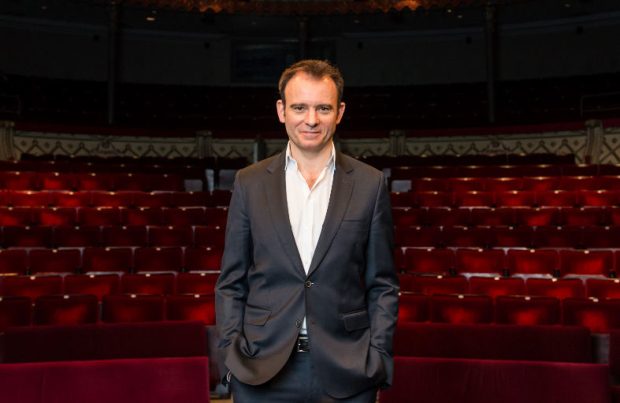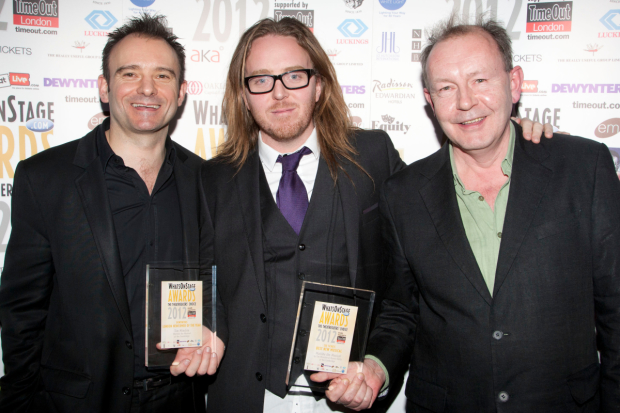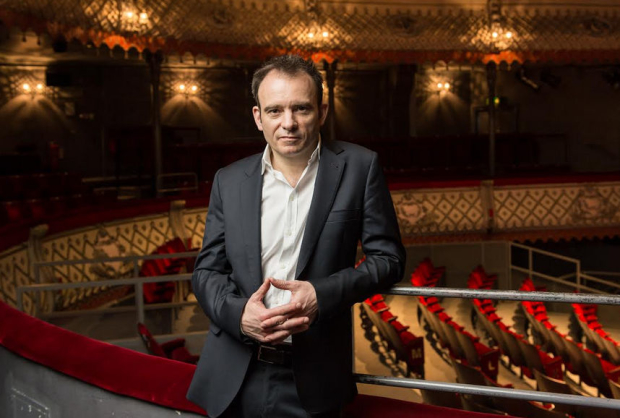Matthew Warchus on his 'something for everyone' approach at the Old Vic

© Manuel Harlan
Matthew Warchus, whose directing credits include Matilda, Ghost, The Norman Conquests and God of Carnage, has just announced his first season as artistic director of the Old Vic. Here, he discusses putting new work at the heart of his programme, and stepping into Kevin Spacey's glamorous shoes.
You got the Old Vic job nearly a year ago. How's it been since then?
Busy. Within hours of getting the job someone from the Old Vic called me and said "we need to announce your first season in the new year". Then we decided that season would be an entire year of work rather than just two shows. Obviously, I wasn't walking round with a year's season in my head, so I had to scramble to come up with a lot of things very quickly. It's been full of breathtakingly exciting moments and crushing disappointments when projects didn't work out. There's still a bit of nail-biting when it comes to casting, though I'm generally much more relaxed now.
You're opening with a piece of new writing, Future Conditional, which seems an important statement of intent
As part of the mixture of things we're going to do, new writing is an important part of it. It's a sign of a healthy theatre to have a commissioning program. This is a notably historic building with a fantastic heritage, but I also want to create history, and extend its significance. One way of doing that is by generating new work, and that's never existed here before. So that's a very important thing, and we'll also be nurturing writers who won't necessarily have their work shown on the main stage… It's a brilliant play – political, funny, thought-provoking – and has a strong youth aspect, so it represents so many things that I care about.
What does it mean to be giving Groundhog Day its world premiere here?
I was developing it before I got the job and didn't know where it would go, but we wanted to put it in an appropriate venue. As we were developing it it struck me that it's a classic Broadway musical that has a lot in common with shows like The Music Man and Our Town – as such it needs a large audience and a large stage, so the Old Vic was the right fit.
I assume it won't feature the same song repeated over and over again?
Tim [Minchin] and I spent a long time with the writer Danny [Rubin], to see if a musical naturally arose out of Groundhog Day. We did initially think it might be the same song with lots of themes and variations, but it doesn't work like that, because nothing ever repeats for Phil Connors [the weatherman played on screen by Bill Murray]. So he would never sing the same thing twice. He goes on quite a journey from being sarcastic and self-obsessed to being the best version of himself that he can be. There's one sequence that lasts about 25 minutes, with some dialogue breaks, which is Phil's journey to work repeated again and again. There are about 12 different songs in total.
Does the success of Matilda add extra pressure?
Making a new musical is a mountain to climb, and each time you say "that's the last one". So it's hard enough to do without added expectations! They're so hard that actually a lot of the time you don't think about critics or audiences, you just think of the immediate problems you need to solve. You need to be attentive to the demands of the story; Matilda is a great example – we didn't have anyone from the RSC in the development of it trying to impose certain rules on us, or certain expectations. It was all about what the story needed. If you're worried about whether something will succeed or fail, you shouldn't even start. You have to have a bigger reason for doing it.

© Dan Wooller
The production is part of your partnership with Sonia Friedman and Scott Rudin
Its transfer to Broadway will be a prototype for the development of an ongoing model that will see new musicals developed here before transferring to Broadway and the West End. We're making the runs shorter here so we don't burn off the entire audience… And I thought we'd be offering producers a lot of opportunities, so why not charge them for it first. So Scott and Sonia are giving us a big up-front amount of money each year to develop new work. Groundhog Day and The Master Builder will both go to Broadway, and it's highly likely that The Caretaker will as well. I'm aiming to have up to four productions each year that will transfer elsewhere.
Young Vic artistic director David Lan said at the Olivier Awards he runs the 'best theatre in Waterloo' – how do you assess the relationship between your venues?
I think he was actually being humble, not malicious. We see each other regularly, and we share advance details of our programming to ensure we can be complementary. I think it's great what he's done at the Young Vic, and it can only be good news to have two vibrant and lively theatres on the same street. It's not a competition. There are things we can do here, with a larger stage and audience, that are achieving a different thing, and vice versa. David's been very good at developing new directors and I said to him that if he spots somebody who deserves to have a large canvass to work on, give me the nod. We can work as a team, and I like that.
Talk us through your policy on ticket prices
There used to be an under 25 scheme sponsored by PwC [PricewaterhouseCoopers] and they're continuing with our new scheme which is to offer £10 tickets in previews for half the theatre. What I'm interested in is removing the obstacle of affordability for people who think they might be inclined to try out theatre. I'm not somebody who says that everybody has to love theatre, any more than everybody has to love football, but some people could form a really meaningful relationship with theatre and haven't because of the ticket price. So we've got to remove that barrier. I want to create a non-intimidating and unpretentious artistic powerhouse… it's a something for everyone approach.
How do you think your approach and influence will differ to Kevin Spacey's?
It will be enormously different in some respects and not at all in others. While Kevin's been head of the building he's had an enormous number of people helping him, and those people are still here, so how the theatre functions is unchanged on many levels. But my ideology and focus is different. I'll be pretty much invisible. The reason I'm a director is that I like hiding behind other people. My face is only apparent in coded form through the productions I do. I hope that the productions and the life of the theatre in general becomes something that shimmers and glows… [Kevin] could shake somebody's hand and they'd write a cheque. I can't do that, but hopefully they'll write a cheque for my ideas.











